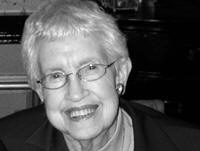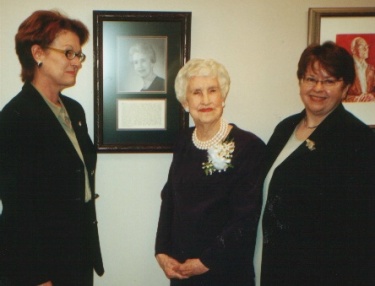
| home |
 Mary A. Lynch was born in 1920 and was raised in
the Lynch family home on Byng Avenue in Sydney, Nova Scotia. Mary obtained a certificate
in Speech Education from Saint Francis Xavier University (St. F.X.) in 1939, after which
she taught private students in the local area before beginning her teaching
career at
Xavier College and later the University College of Cape
Breton UCCB (now Cape Breton University or CBU). In 1963, she obtained her Bachelor's Degree from St. F.X.,
then her Master of Arts in Speech Education from New York University in 1966, and
finally
her Ph.D. in Speech Communication from the University of Michigan (Ann Arbor) in 1975. She
received numerous scholarships, fellowships, and awards throughout her academic
career as
a student and a teacher. Mary A. Lynch was born in 1920 and was raised in
the Lynch family home on Byng Avenue in Sydney, Nova Scotia. Mary obtained a certificate
in Speech Education from Saint Francis Xavier University (St. F.X.) in 1939, after which
she taught private students in the local area before beginning her teaching
career at
Xavier College and later the University College of Cape
Breton UCCB (now Cape Breton University or CBU). In 1963, she obtained her Bachelor's Degree from St. F.X.,
then her Master of Arts in Speech Education from New York University in 1966, and
finally
her Ph.D. in Speech Communication from the University of Michigan (Ann Arbor) in 1975. She
received numerous scholarships, fellowships, and awards throughout her academic
career as
a student and a teacher.Mary Lynch started teaching Speech Communication in 1960 at Xavier Junior College in Sydney. At that time, Public Speaking was the only speech communication course offered; it was worth two credits and was a required part of the curriculum. In 1968-69, the department grew to three sections of Speech Communication 100, and students were free to choose or ignore the course as it was now a free elective rather than compulsory. To the amazement of some, all three sections of SC100 were closed due to full capacity the first day of registration. Mary's tireless efforts are indicated by the size of growth the department underwent during her tenure at UCCB. At the time of her retirement in 1984, there were eleven three-credit courses and a fully equipped and operational experiential learning lab. In the spring of 1965, Dr. Lynch was appointed to full-time faculty at the rank of Lecturer. She recounts how, at long last, she was permitted to attend monthly faculty meetings. At the time, she thought perhaps some day she might even be assigned a desk she could call her own or, better still, an office. But such amenities were not nearly as important as the needed recognition by her peers that the discipline she represented was one of true academic significance and merit. Little did she realize it would take until January of 1983 before the Faculty of Arts & Sciences would formally recognize the discipline as worthy of full academic status, respectability, and further support afforded more traditional subjects. Her untiring dedication to the discipline was great. Throughout her academic career, Mary persevered to establish a communication experiential learning lab as an adjunct to the basic communication courses. She recalls asking Dr. Malcolm MacLellan, principal of Xavier Junior College at the time, if she could access a small room that was being used for storage so her students could put into practice the skills and concepts they were learning in class. In 1967, Mary moved her students from this broom closet and founded and began operating a Speech Communication Lab on the second floor of MacLeod House on the Xavier College Campus. In 1972, the lab was moved into larger quarters at the corner of George and Ferry Streets. This was the first year that Mary used student helpers (known today as peer facilitators). She was extremely proud when we moved to the current Cape Breton University campus in 1979 and had that new lab space after beginning in an unused storage space at "Little X."
|
 October 18, 2001 - Official Dedication of the Dr. Mary A.
Lynch Communication Lab. Today's dedication of the communication lab is in
recognition of Dr. Lynch's outstanding leadership as a founding Department member of
October 18, 2001 - Official Dedication of the Dr. Mary A.
Lynch Communication Lab. Today's dedication of the communication lab is in
recognition of Dr. Lynch's outstanding leadership as a founding Department member of